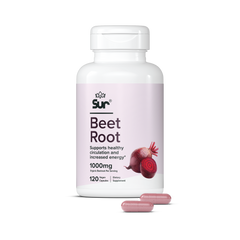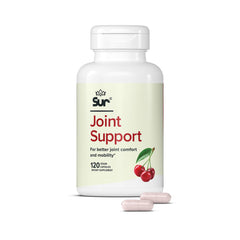Plant-based nutritional supplements are vegan-friendly products designed to provide essential nutrients while supporting overall health without relying on animal sources. One of the standout benefits of plant-based supplements is heart health, and ingredients like oats and their naturally occurring beta-glucans are especially effective. Beta-glucans help reduce cholesterol and support healthy blood circulation, making them a key component in vegan heart health supplements.
At Sur, our Nutrim supplement harnesses the power of whole oat fiber and beta-glucans to support cardiovascular wellness, maintain healthy cholesterol levels, and promote overall digestive health. Incorporating plant-based nutritional supplements like Nutrim into a balanced diet allows you to experience the full benefits of plant-based supplements, while supporting sustainable, ethical nutrition choices.
Common Vegan Supplements to Lower Cholesterol
High cholesterol increases the risk of heart complications like stroke, heart attack, and coronary heart disease. Supplementing your daily meals with the right nutrients will help you keep your cholesterol levels down.
Here are some of the main plant-based supplements you should consider:
Oats
Oats are a natural source of soluble fiber that can help lower cholesterol levels and support heart health. Incorporating oats into your diet provides essential nutrients while promoting healthy digestion and stable blood sugar.
Sur’s Nutrim supplement leverages whole oat fiber to deliver these benefits in a convenient, plant-based form, making it easier to include heart-healthy oats in your daily routine.
Beta-Glucans
Beta-glucans are a type of soluble fiber found in oats and other whole grains that help reduce LDL (‘bad’) cholesterol by binding to cholesterol in the digestive tract and promoting its elimination. Regular intake of beta-glucans has been shown to improve cardiovascular health and support proper blood lipid levels.
Our Nutrim is rich in beta-glucans, providing a vegan-friendly supplement option that combines the cholesterol-lowering benefits of oats with convenient daily nutrition.
Soluble Fiber
Soluble fiber absorbs water as it travels down the digestive tract and turns into a greasy paste, slowing down digestion. It comes from a wide variety of food items, including fruits and vegetables, legumes, nuts and seeds, and whole grains.
This type of fiber binds itself to the cholesterol in your digestive tract and eliminates it from your body when you pass stool.
Sterols and Stanols
Sterols and stanols are plant compounds that occur naturally and mimic cholesterol. They trick your digestive system into believing it has absorbed enough cholesterol from food.
Taking a few grams of these plant compounds every day may help lower your total cholesterol, especially your bad cholesterol. Sterols and stanols are found in many plant-based ingredients, including nuts, vegetables, seeds, fruits, and legumes.
Omega-3
Omega-3 fatty acids help lower blood triglycerides–the fat in your bloodstream that is converted into energy when your body needs additional energy. Triglycerides come from the extra calories you consume.
Small doses of omega-3 fatty acids daily can reduce the secretion of triglycerides from your liver by providing your body with enough fatty acids needed for oxidation (breaking fatty acids down to generate energy). This reduces the amount of unused fat in your bloodstream, thus bringing your cholesterol levels down. However, experts warn consumers against taking unregulated omega-3 fatty acids supplements to avoid complications.
Vitamin B3
Commonly referred to as ‘niacin,’ vitamin B3 enables your body to convert food into usable energy. It also contributes significantly to keeping your skin, digestive system, and nervous system in good condition.
This vitamin prevents your liver from producing excess triglycerides that are likely to cause your cholesterol levels to rise. Niacin also helps increase good cholesterol–high-density lipoprotein (HDL) to counter the bad cholesterol.
Niacin can be found in a wide range of fruits, vegetables, whole grains, legumes, nuts, and seeds. However, follow your healthcare provider’s instructions when consuming this supplement to avoid possible side effects.
Red Yeast Rice
Also referred to as ‘red rice koji,’ red yeast rice is a product of fermented rice. This rice is fermented with a special type of yeast known as ‘monascus purpureus.’ This process enables the rice to acquire essential chemicals like ‘monacolin K,’ which affects cholesterol levels. Monacolin K is the same as a statin drug, which can lower cholesterol levels and other types of fats in your blood.
Closing Thoughts
These plant-based supplements can potentially lower your cholesterol levels, especially when they’re combined with a healthy diet and consistent physical activity. For reliable nutrition essentials and vegan supplements, including the best beet supplement for blood pressure, explore the Sur website today!
Medical Disclaimer: The information in this article is for educational purposes only and is not intended as a substitute for professional medical advice, diagnosis, or treatment. Always consult with a qualified healthcare provider before beginning any supplement regimen, especially if you are pregnant, nursing, have a medical condition, or are taking medication. Sur Nutrition products are not intended to diagnose, treat, cure, or prevent any disease. Individual results may vary.



